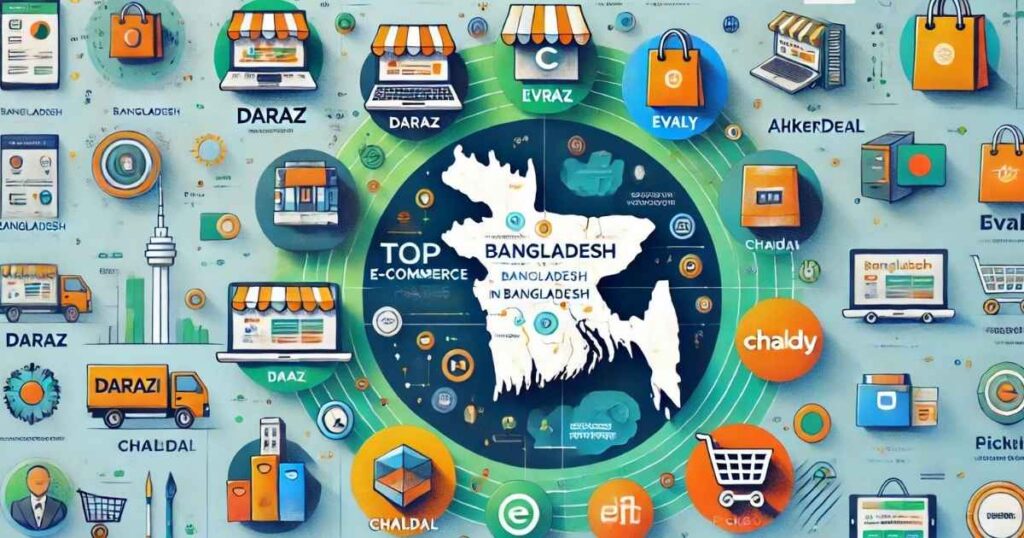Introduction
In recent years, Bangladesh has witnessed a remarkable surge in e-commerce activity, transforming the way people shop and conduct business. The digital landscape of the country has evolved rapidly, with numerous online platforms emerging to cater to the growing demand for convenient and diverse shopping experiences. This article delves into the top e-commerce sites in Bangladesh, exploring their unique features, market positions, and impact on the country’s digital economy. From established giants to innovative startups, we’ll examine how these platforms are shaping the future of retail in Bangladesh. As we navigate through the top e-commerce sites in Bangladesh, we’ll uncover the factors driving their success and the challenges they face in this dynamic market.
| Year | E-commerce Users (millions) | E-commerce Revenue (USD billions) |
| 2020 | 30.0 | 2.0 |
| 2021 | 35.5 | 2.8 |
| 2022 | 41.2 | 3.7 |
| 2023 | 47.8 | 4.9 |
| 2024 | 55.0 | 6.2 |
The E-commerce Landscape in Bangladesh
Overview of the Market
The e-commerce sector in Bangladesh has experienced exponential growth over the past decade. With a population of over 165 million and rapidly increasing internet penetration, the country presents a vast and largely untapped market for online retail. According to recent studies, the e-commerce market in Bangladesh is expected to reach $3 billion by 2023, growing at an annual rate of 26%.
Several factors contribute to this growth:
- Increasing smartphone adoption
- Improved internet connectivity
- Rising middle-class population
- Government initiatives to promote digital transactions
Key Players and Market Share
The Bangladeshi e-commerce market is dominated by a mix of local and regional players. While international giants like Amazon have yet to establish a significant presence, homegrown platforms have flourished, catering to local needs and preferences.
Top E-commerce Platforms in Bangladesh
1. Daraz

Daraz, now owned by Alibaba Group, is arguably the largest e-commerce platform in Bangladesh. Originally founded in 2012, it has grown to become a household name in online shopping.
Key Features:
- Wide range of products across multiple categories
- Regular flash sales and promotions
- Daraz Mall for authentic branded products
- Daraz Mart for grocery shopping
Market Position:
Daraz holds a significant market share, estimated at around 30-35% of the e-commerce market in Bangladesh. Its acquisition by Alibaba in 2018 has further strengthened its position, providing access to advanced technology and logistics solutions.
Impact on the Industry:
Daraz has played a crucial role in popularizing online shopping in Bangladesh. Its marketing campaigns and customer education initiatives have helped build trust in e-commerce among consumers.
2. Chaldal

Chaldal has carved out a niche for itself as the leading online grocery platform in Bangladesh.
Key Features:
- Specializes in groceries and household essentials
- Same-day delivery in major cities
- User-friendly mobile app
- Subscription-based delivery service
Market Position:
While focusing primarily on groceries, Chaldal has established itself as a leader in this segment, with a market share of approximately 15-20% in the online grocery sector.
Innovation and Growth:
Chaldal’s success lies in its innovative approach to last-mile delivery and inventory management. The company has developed a network of micro-warehouses across urban areas, enabling quick and efficient deliveries.
3. Evaly
 Evaly burst onto the scene with aggressive marketing and attractive offers, quickly gaining attention in the e-commerce space.
Evaly burst onto the scene with aggressive marketing and attractive offers, quickly gaining attention in the e-commerce space.
Key Features:
- Wide product range including electronics, fashion, and home appliances
- Competitive pricing and frequent discounts
- EMI options for high-value purchases
Market Challenges:
Despite its rapid growth, Evaly has faced regulatory scrutiny and financial challenges. This case highlights the importance of sustainable business models in the e-commerce sector.
4. Pickaboo
Pickaboo has established itself as a go-to platform for authentic electronics and gadgets.
Key Features:
- Focus on electronics, mobile phones, and accessories
- Official partnerships with major brands
- Extended warranty options
- Quick delivery in urban areas
Market Position:
Pickaboo holds a strong position in the electronics segment of e-commerce, with an estimated market share of 10-15% in this category.
5. Ajkerdeal
Ajkerdeal is one of the pioneers of e-commerce in Bangladesh, known for its diverse product offerings and support for local sellers.
Key Features:
- Platform for both B2C and C2C transactions
- Strong focus on local products and handicrafts
- Regular deals and discounts
Community Impact:
Ajkerdeal has played a significant role in bringing small and medium enterprises (SMEs) online, contributing to the digital transformation of local businesses.
Emerging Trends in Bangladesh’s E-commerce

Mobile-First Approach
With over 100 million mobile internet users, Bangladesh’s e-commerce sector is increasingly adopting a mobile-first strategy. Most platforms have invested heavily in developing user-friendly mobile apps and optimizing their websites for mobile devices.
Rise of Social Commerce
Social media platforms, particularly Facebook, play a crucial role in Bangladesh’s e-commerce ecosystem. Many small businesses and individual entrepreneurs use Facebook pages and groups to sell products, often referred to as “F-commerce.”
Integration of Fintech Solutions
The growth of e-commerce has gone hand in hand with the development of digital payment solutions. Mobile financial services like bKash and Nagad have become integral to online transactions, addressing the challenges posed by low credit card penetration.
Challenges and Opportunities

Logistics and Infrastructure
One of the biggest challenges facing e-commerce in Bangladesh is the development of efficient logistics networks. While urban areas are well-served, reaching rural consumers remains a challenge.
Building Trust
Ensuring product quality and authenticity is crucial for building consumer trust. Many platforms are implementing strict vendor verification processes and customer review systems to address this issue.
Regulatory Environment
The government of Bangladesh has been working on developing a comprehensive e-commerce policy. Clear regulations will be crucial for the sustainable growth of the sector.
The Future of E-commerce in Bangladesh
The future of e-commerce in Bangladesh looks promising, with several factors driving growth:
- Increasing internet penetration
- Growing middle class with higher disposable income
- Government initiatives to promote digital transactions
- Improvements in logistics and delivery infrastructure
Experts predict that the e-commerce market in Bangladesh could reach $10 billion by 2025, driven by these factors and continued innovation in the sector.
Case Studies: Success Stories in Bangladesh E-commerce

Pathao: From Ride-Sharing to E-commerce
Pathao, originally a ride-sharing service, successfully expanded into the e-commerce space with Pathao Food and Pathao Shop. This diversification showcases the potential for tech companies to leverage their existing user base and technology infrastructure to enter the e-commerce market.
ShopUp: Empowering Small Businesses
ShopUp has made significant strides in bringing small businesses online. By providing a suite of services including an e-commerce platform, logistics support, and access to financial services, ShopUp has enabled thousands of micro and small enterprises to participate in the digital economy.
The Role of Government and Regulatory Bodies
The government of Bangladesh has recognized the potential of e-commerce to drive economic growth and digital transformation. Several initiatives have been launched to support the sector:
- Digital Bangladesh Vision 2021
- National Digital Commerce Policy 2018
- Establishment of the e-Commerce Association of Bangladesh (e-CAB)
These efforts aim to create a conducive environment for e-commerce growth while ensuring consumer protection and fair competition.
Impact of COVID-19 on E-commerce in Bangladesh
The COVID-19 pandemic has accelerated the adoption of e-commerce in Bangladesh. Lockdowns and social distancing measures led to a surge in online shopping, with many consumers making their first online purchases during this period.
Key impacts include:
- Rapid growth in essential goods and grocery deliveries
- Increased adoption of digital payments
- Emergence of new e-commerce players catering to specific needs
Sustainability and Corporate Social Responsibility

As the e-commerce sector matures, there is growing awareness of the need for sustainable practices. Leading platforms are implementing initiatives such as:
- Eco-friendly packaging
- Supporting local artisans and small businesses
- Corporate social responsibility programs focusing on education and digital literacy
Technology Innovations Driving E-commerce Growth
Artificial Intelligence and Machine Learning
E-commerce platforms are increasingly using AI and ML to enhance user experience through:
- Personalized product recommendations
- Chatbots for customer service
- Predictive inventory management
Augmented Reality (AR) for Enhanced Shopping Experience
Some platforms are experimenting with AR technology to allow customers to virtually “try on” products or visualize furniture in their homes before making a purchase.
FAQ Section
H4: What are the most popular payment methods for e-commerce in Bangladesh?
The most popular payment methods include Cash on Delivery (COD), mobile financial services like bKash and Nagad, and debit/credit cards. COD remains prevalent due to trust issues and low credit card penetration.
H4: How safe is online shopping in Bangladesh?
Reputable e-commerce platforms in Bangladesh implement security measures to protect customer data and transactions. However, consumers are advised to shop from well-known sites and be cautious of deals that seem too good to be true.
H4: Can I return products purchased online in Bangladesh?
Many e-commerce platforms in Bangladesh offer return and refund policies. However, the terms can vary between platforms and sellers. It’s important to check the return policy before making a purchase.
H4: Are there any international e-commerce sites that deliver to Bangladesh?
While major international platforms like Amazon don’t directly serve Bangladesh, some global sites do offer shipping to the country. However, additional customs duties and longer delivery times may apply.
Conclusion
The e-commerce landscape in Bangladesh is vibrant and rapidly evolving. From established players like Daraz to innovative startups, the sector is driving digital transformation and creating new opportunities for businesses and consumers alike. As internet penetration continues to grow and digital literacy improves, e-commerce is poised to play an increasingly important role in Bangladesh’s economy.
The challenges of logistics, trust-building, and regulation are being actively addressed by both the private sector and government initiatives. With continued innovation and a focus on meeting local needs, Bangladesh’s e-commerce sector is well-positioned for sustained growth in the coming years.
As consumers become more comfortable with online shopping and as technology continues to advance, we can expect to see even more exciting developments in this space. The future of e-commerce in Bangladesh looks bright, promising convenience, choice, and economic opportunities for millions of Bangladeshis.
External Resources
For more information on e-commerce in Bangladesh, you can refer to the following resources:
- E-Commerce Association of Bangladesh (e-CAB)
- Bangladesh Bank: Guidelines on E-commerce
- LightCastle Partners: Bangladesh E-Commerce Sector Research



